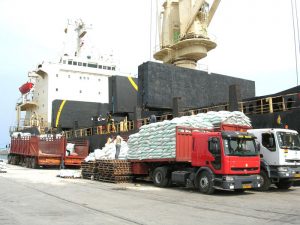The Kosmos Innovation Centre (KIC), at its Agricultural Innovation for Africa (AIA) Conference, has said youth engagement in agriculture remains key to ensuring food security.
The KIC explained that agriculture decision-makers, subject matter experts, professionals, industry stakeholders and value chain actors must rethink the future of agricultural innovation with priority on the youth-led initiatives.
On the theme ‘Empowering youth start-ups and agri-MSMEs in Africa: advancing food security through innovation and collaboration’, the two-day conference sought to offer a platform for education on the necessary systems to help Africa on its journey to meet the Sustainable Development Goal (SDG) goal two, with key emphasis on youth engagement in the sector.
Addressing participants at the event, Board Chair of KIC and Head-Ghana Business Unit, Kosmos Energy, Joe Mensah, said the AIA conference continues empowering young people to actively embrace agriculture – with technology as a core catalyst driving efficiency from productivity to marketing and trade of agricultural commodities.
“The agricultural value chain in Africa has enormous potential for transformation, and there is a need to connect the different value chain actors in ways which involve young people and agric-MSMEs in AgriTech end-to-end solutions,” Mr. Mensah suggested.
Despite agriculture becoming the main pillar of support for the economy in this pandemic period, the 2021 Heifer International Report revealed that only five percent of Ghanaian youth are engaged in the sector.
The report indicated that even though the nation’s agricultural sector is well-placed to contribute in the country’s development goals, its growth performance has been erratic.
The report said of the five percent in the sector, just about 12 percent are using any form of technology.
According to the report, 37 percent of the youth say access to finance, 14 percent cite access to land, and 12 percent have lack of training as the three key barriers to youth engagement in agriculture.
However, Mr. Mensah assured that Kosmos Innovation Centre’s strategic vision includes providing young people with the necessary tools, skills and capacity-building to identify opportunities, while linking them to potential investors to scale up.
As a non-profit organisation that invests in young entrepreneurs and small businesses, the KIC has trained more than 2,600 young leaders to establish start-ups.
This, according to Mr. Mensah, is the reason KIC has over the years brought together entrepreneurs, thought-leaders, governments, the private sector and civil society to create a transformational approach for agriculture in Africa.
He highlighted the power of collaboration, harnessing local knowledge and technology as well as sustainability as the themes that run through the conference.
Deputy Minister of Food and Agriculture Minister, Yaw Frimpong Addo, indicated that government, through the ministry, is committed to the vision of ensuring a modernized agricultural sector, culminating in a structurally transformed economy and evident in food security, employment opportunities and reduced poverty.
“Young people and agri-MSMEs will play a critical role in this regard. Our programmes and strategies have been developed to ensure particular attention is paid to youth-led startups and agri-MSMEs,” the minister said.
Mr. Frimpong Addo explained that key strategies – including the West Africa Food Systems Resilience Programme, Modernizing Agriculture in Ghana (MAG), Ghana Commercial Agriculture Project and the upcoming launch of PFJ phase-two – are all initiatives to promote inclusion and employment opportunities for the youth in agriculture.
In all, the conference explored about twelve topics in the agriculture value chain; from solutions to opportunities, investments, sustainability, financing, digitisation, gender mainstreaming and government policies, among others.






